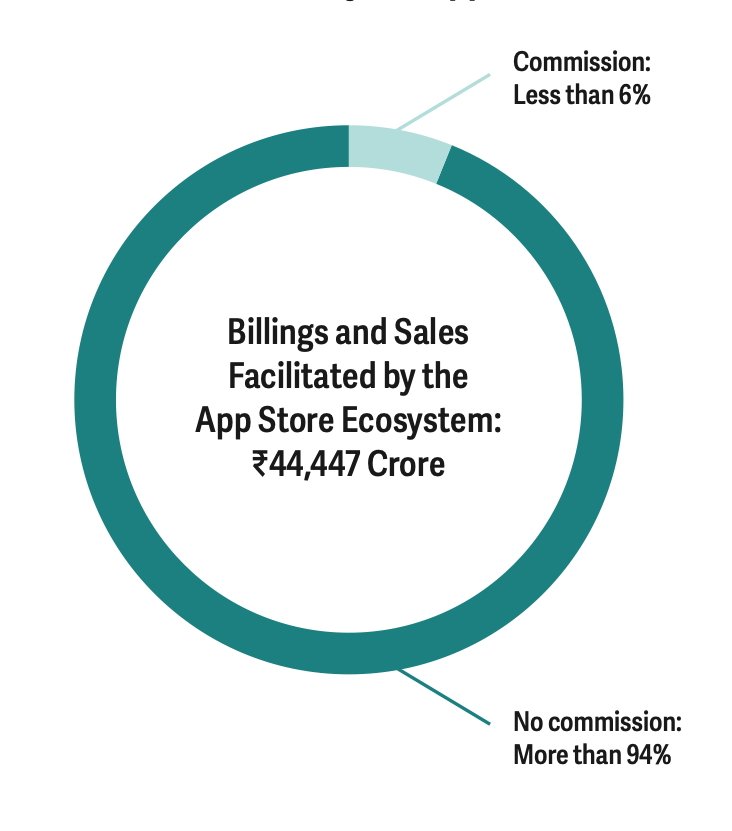Apple fights India antitrust claims by boasting how much developers have been paid
Apple has highlighted that developers in India earned $5.31 billion from the App Store in 2024, but makes the real headline be just how little developers have had to pay Apple itself.

Indian developers earned $5.31 billion in 2024 -- image credit: Apple
Apple has occasionally promoted how much money developers make from the App Store -- in 2018 it said they'd earned $100 billion since the store opened, and then in 2019 the total was $120 billion. It's now singled out a study that reports Indian developers earned $5.31 billion from Apple during 2024 -- but it's really saying that as part of its defence against accusations of anti-competitive practices.
"The App Store has been an economic miracle for developers in India and all around the world, and we're thrilled to support their work," Tim Cook said in a statement. "This study underlines the power of India's incredibly vibrant app economy."
"And we're committed to keep investing in the success of developers of all sizes as they build apps that make an important impact and enrich people's lives," he continued.
The full study is by Professor Viswanath Pingali from the Indian Institute of Management Ahmedabad. Apple is hosting the report and is credited with having supported it, but it's not clear whether the company commissioned it.
What is emphasized several times in the report is the point that more than 94% of the $5.31 billion was earned without any commission paid to Apple. Apple is highlighting this figure after Indian regulators accused it in 2024 of abusing its market dominance.

Detail from the report stressing how little Apple earns from its developers in India -- image credit: Apple
However, not all of the $5.31 billion comes from App Store sales, as may be implied. Instead, Professor Pingali's report breaks the earnings down into three categories:
- Digital goods and services
- Physical goods and services
- In-app advertising
The first category includes sales of apps themselves, and any in-app purchases such as subscriptions. That accounts for approximately 6% of the $5.31 billion earned, and in-app advertising accounts for a similar 7%.
All of the rest, some 88% of the total, comes from the physical goods and services category. Those include food delivery, grocery delivery, ride hailing, and the use of shopping apps for general retail.
It's true, however, that the App Store has facilitated all of this. Plus Apple notes that according to the report, "close to 80% of India-based developers' App Store earnings came from users outside of the country."
So Apple's study is emphasizing that the App Store has been a general economic boon for developers. And it's published this just after the European Union has fined it $570 million for alleged anti-competitive practices.
Read on AppleInsider

Comments
Professor Viswanath Pingali wrote something similar last year "India is not Europe" in a paper published for ICLE with 4 people from ICLE including the founder and a researcher that is close to Amazon. Viswanath Pingali was the only one being external. Together the five concluded that EU policies weren't in the best interest of India. He is also quoted by Google on how India should regulate Google less.
ICLE is funded by Amazon, Meta, and CCIA - the lobby organization for the computer industry where Apple is a prominent member. He is simply on repeat adding his name and title to publications funded by the computer industry.
The real problem to Apple is India looking at regulation from outside and India being good at regulations. India followed EU on USB-C. Imagine if India would allow another App Store to give Indian developers a bigger cut. Other countries would then say "we should do as India". This is the same as when Big Tobacco tried to avoid legislation. It should change how we look at Apple.
Monkey see monkey do. India sees other countries jumping on the money/grafting bandwagon and thinks why shouldn’t they? The EU and the Justice Department often do a disservice to their native companies, especially when they don’t clearly think through the problems they’re trying to solve using antitrust laws, to over come some market shortages in infrastructure, some perceived competitive disadvantages or just simply to add on some type of new tax or fine. Bureaucrats around the world seem to have one thing in common: tunnel vision.